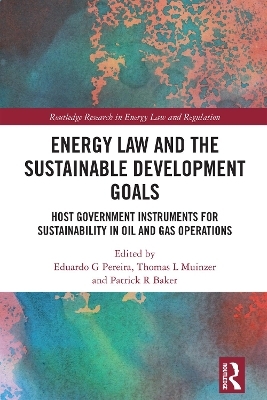
Energy Law and the Sustainable Development Goals
Routledge (Verlag)
9781032157436 (ISBN)
The UN Sustainable Development Goals are an ambitious agenda for environmental sustainability, economic development, and social transformation. The SDGs include targets for governments, in partnership with private industry and communities, to improve access to affordable and reliable energy, reduce inequality, protect natural resources, and invest in transparent legal institutions and resilient infrastructure. Although transitioning energy systems towards a low-carbon future is a core aspect of the SDGs, the International Energy Agency anticipates that oil and gas will remain a significant component of the global energy mix for some time. Host Government Instruments are tools which governments use to grant oil and gas companies permission to develop state-owned resources. In addition to bringing substantial resources into governments, these HGIs often also include environmental commitments as well as commitments to local hiring, stakeholder engagement, and investment in economic development programmes. The different structures of HGIs and their precise terms and conditions are crucial determinants of the sustainability of oil and gas operations conducted thereunder.
This book addresses how governments can use HGIs to advance the SDGs. Part I introduces the SDGs and the legal institutions and governance related to HGIs, including in relation to international energy development, international environmental treaties, the Paris Agreement, and human rights regimes. Part II examines specific provisions within HGIs and regulatory systems which relate to the oil and gas sector and SDGs. It provides case studies to illustrate approaches to HGIs and to identify opportunities for host governments and international oil and gas companies to advance the SDGs.
The book concludes with a summary of recommendations regarding how host governments, in partnership with the oil and gas industry, can use HGIs to advance economic development and sustainability goals, and advances potential insights towards development of new and renewable resources.
Eduardo G Pereira is a worldwide recognised scholar specialising in Natural Resources and Energy Law. He has been active in the natural resources and energy industry for more than 15 years. He has practical experience in over 50 jurisdictions covering America, Europe, Africa, and Asia. Thomas L Muinzer, FRSA, is Co-Director of the Aberdeen University Centre for Energy Law, based at the University of Aberdeen, Scotland, where he is Reader in Energy Transition Law. His teaching, research, and consultancy work focuses most particularly on climate and energy decarbonisation law and policy. Thomas is a founding member of the Scottish Climate Emergency Legal Network. Patrick R Baker, JD, Associate Professor of Law, The University of Tennessee Martin, joined the UTM faculty in 2016 and currently teaches law within the College of Business and Global Affairs. In the summer of 2017, he served as a visiting scholar at Queen Mary University of London.
1. Introduction
Part I: The Sustainable Future of International Oil and Gas Developments
2. The Sustainable Development Goals
3. Climate Change and a Just Energy Transition
4. Human rights, CSR, UNDRIP, and Community Engagement
5. Fostering SDGs via Partnership Risk Sharing
6. Mitigating the Resource Curse: Economic, Governance and Policy Considerations
Part II: Addressing the Sustainable Development Goas in a Host Government Instrument
7. Achieving Sustainable Development Goals through the Utilization of Host Granting Instruments
8. Utilizing Local Content Requirements in the Extractive Industries to Achieve Sustainable Development Goals
9. Environment, Health and Safety (EHS) Management in the Petroleum Industry: Implications for Climate Change and Sustainable Development
10. Petroleum Fiscal Regimes and the Sustainable Development Goals: Exploring Alignments and Misalignments
11. The Role of Cross-Border Unitisation in Advancing UN SDGl 16 (Peace, Justice and Strong Institutions) and SDG 9 (Industry, Innovation and Infrastructure)
12. Joint Developments
13. Stability
14. Conclusion
| Erscheinungsdatum | 21.04.2024 |
|---|---|
| Reihe/Serie | Routledge Research in Energy Law and Regulation |
| Zusatzinfo | 8 Tables, black and white; 4 Line drawings, black and white; 5 Halftones, black and white; 9 Illustrations, black and white |
| Verlagsort | London |
| Sprache | englisch |
| Maße | 156 x 234 mm |
| Gewicht | 660 g |
| Themenwelt | Recht / Steuern ► Allgemeines / Lexika |
| Recht / Steuern ► EU / Internationales Recht | |
| Recht / Steuern ► Öffentliches Recht ► Umweltrecht | |
| Wirtschaft ► Volkswirtschaftslehre | |
| ISBN-13 | 9781032157436 / 9781032157436 |
| Zustand | Neuware |
| Informationen gemäß Produktsicherheitsverordnung (GPSR) | |
| Haben Sie eine Frage zum Produkt? |
aus dem Bereich


